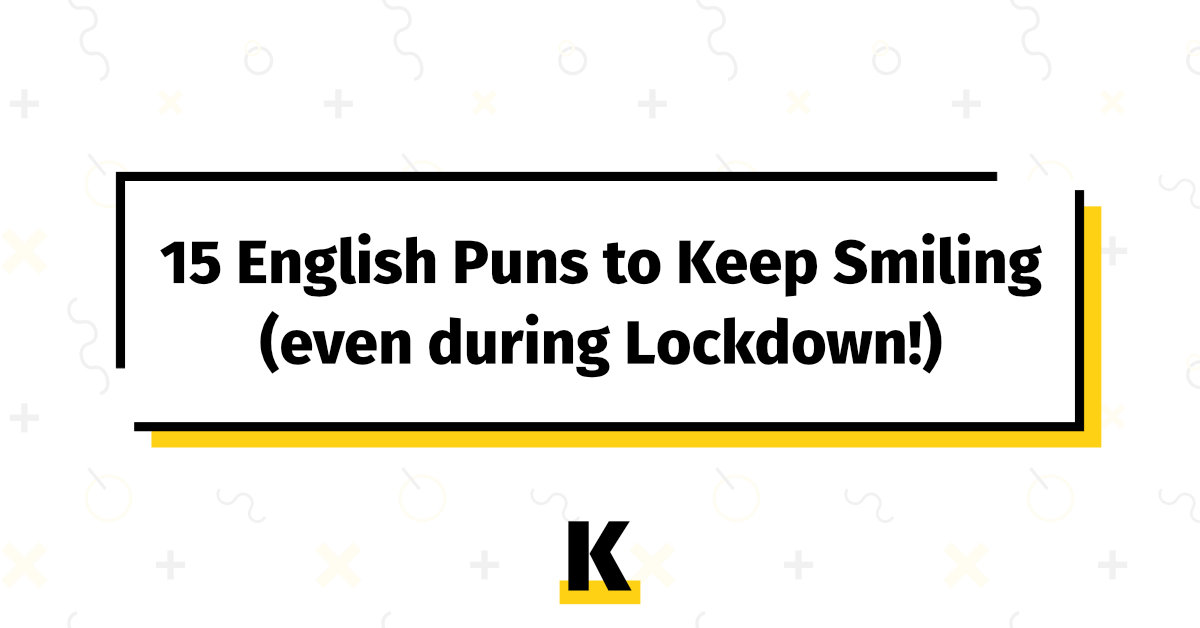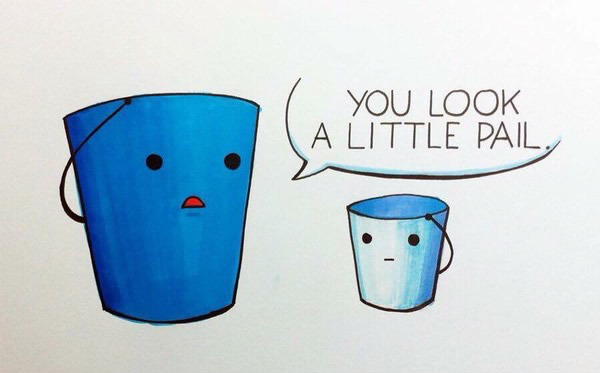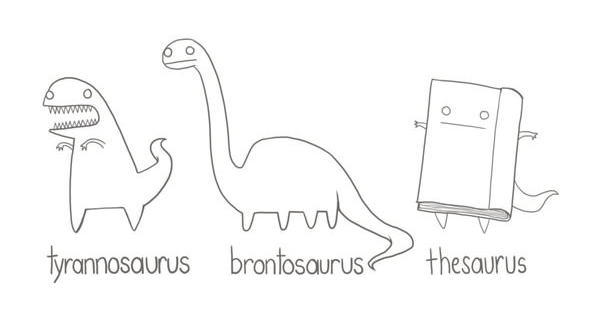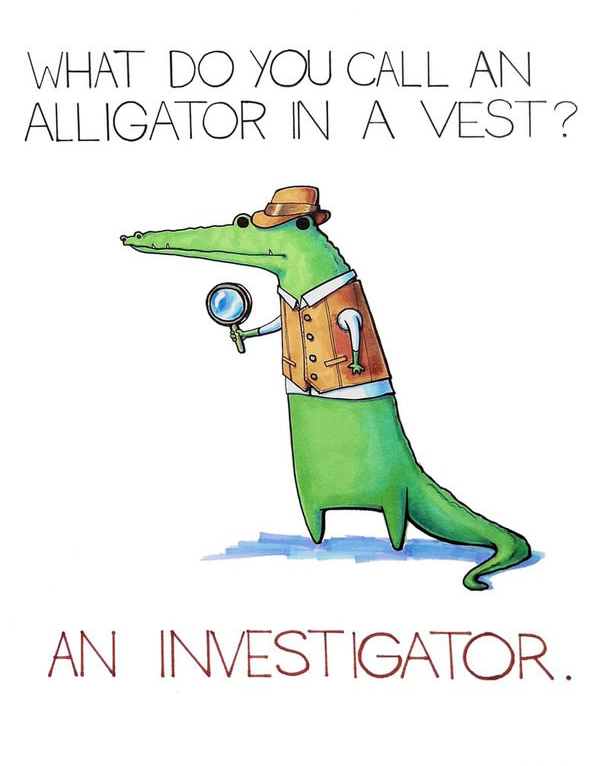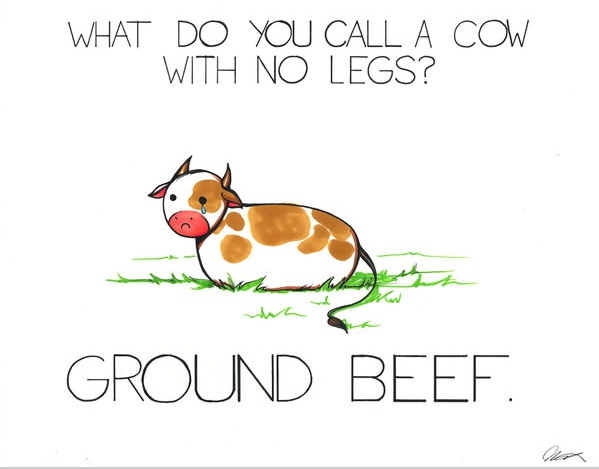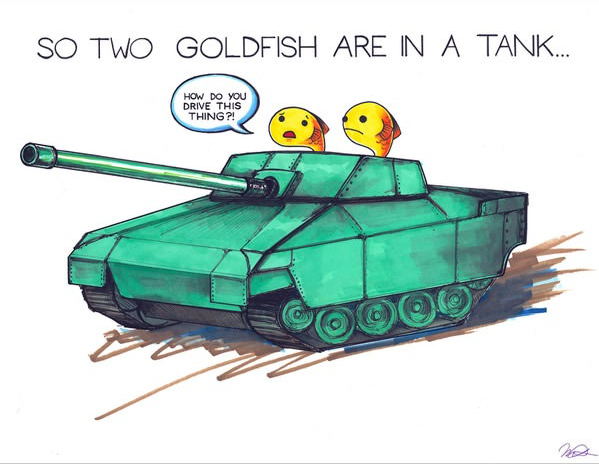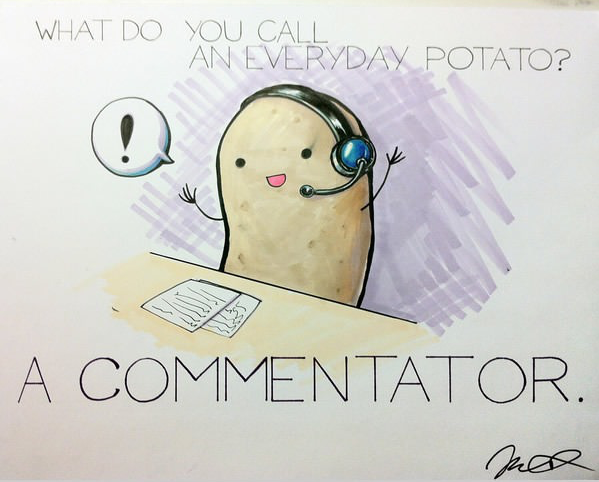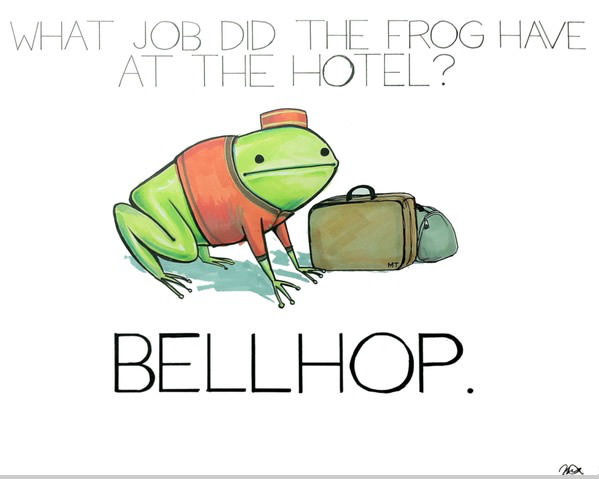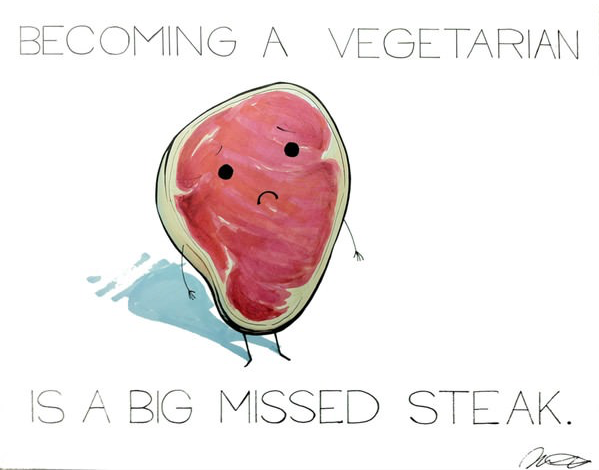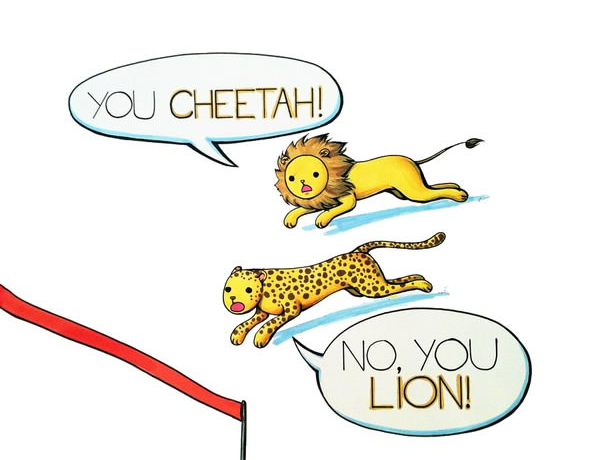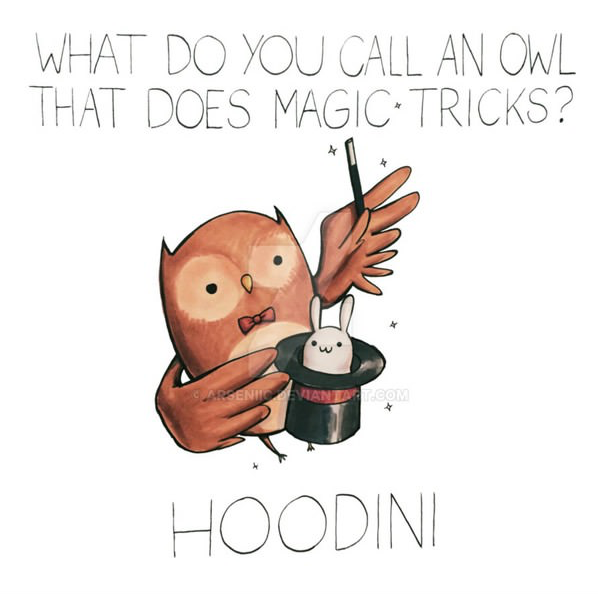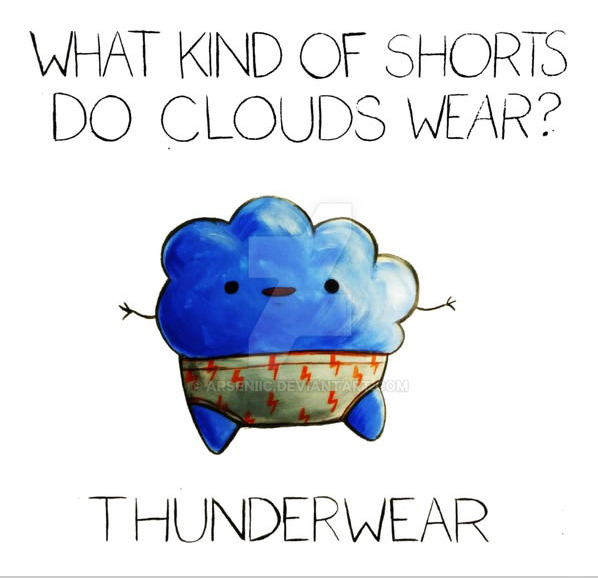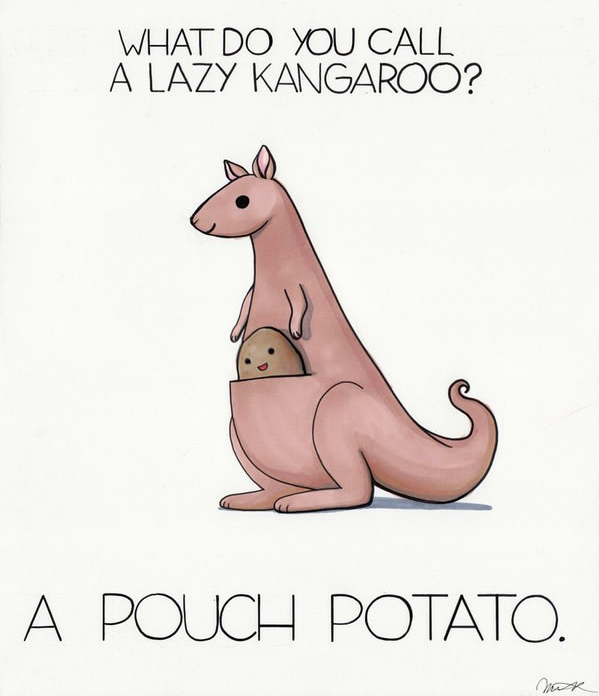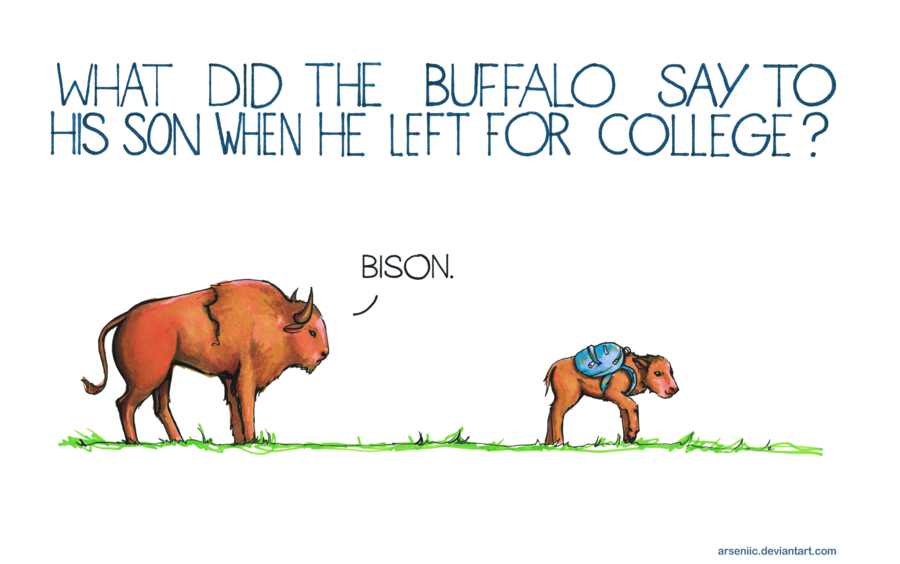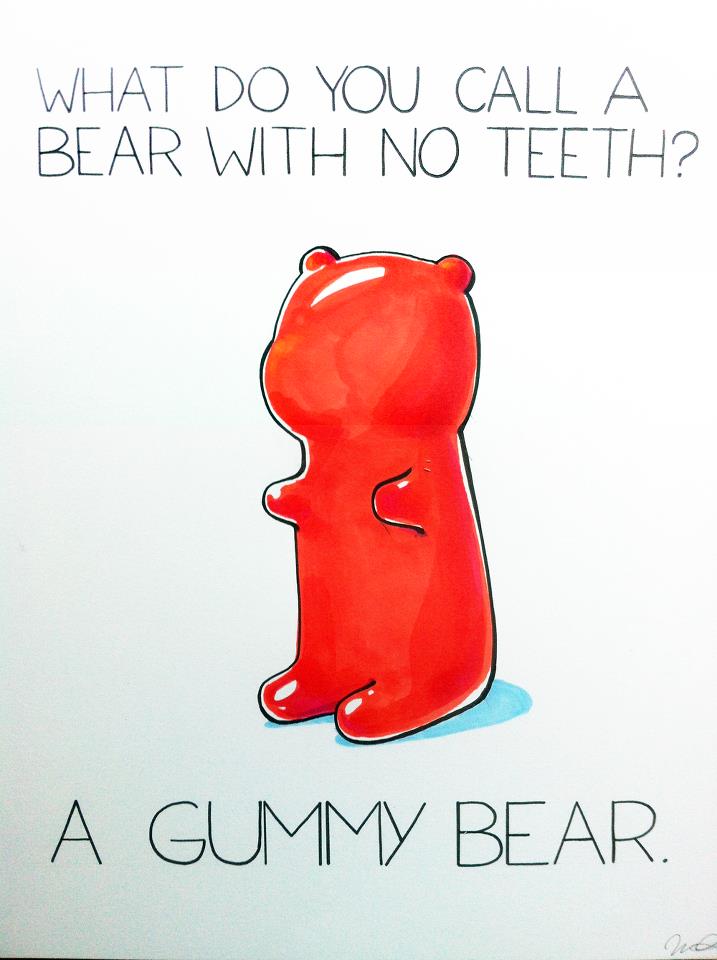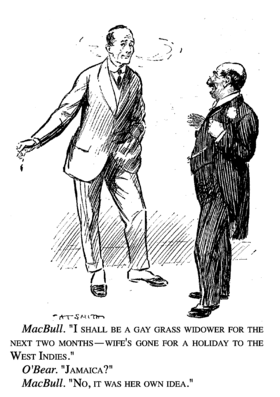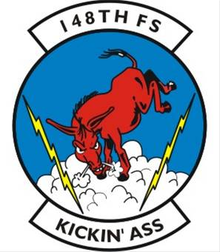So the other day I was chatting with one of my best friends and she sent me a link with loads of beautifully illustrated puns in English. Along with the link, she wrote: “There you go, for your blog!”. And boooooy, was she right! It is not rare to find illustrated puns nowadays, given the rise of memes a few years ago. However, although they can still be just as funny, most of them are not professionally illustrated. For this reason, I absolutely love it when I come across a collection of English puns with fabulous illustrations, so I can’t help sharing them with you guys.
- What are «puns»?
- Puns in English
- 1. Feeling unwell
- 2. A special kind of dinosaur
- 3. A curious alligator
- 4. What a party!
- 5. Poor cow!
- 6. Goldfish go to war
- 7. A talkative potato
- 8. A working frog
- 9. Going vegetarian
- 10. Who’s faster?
- 11. A cool magician
- 12. Cloudy clothes
- 13. A lazy kangaroo
- 14. Off to college!
- 15. Yummy!
What are «puns»?
That being said, for those of you who can’t remember what puns are, let me enlighten you. According to Oxford Dictionaries, a pun is
a joke exploiting the different possible meanings of a word or the fact that there are words which sound alike but have different meanings.
I already wrote an introduction to puns in a very old post “Things Are Getting Punny“, in case you want to check it out before reading on. But for those of you who are already familiar with puns, let’s begin with these 15 puns that will keep you smiling this week. What I’ll do is list the punny pictures with a related title, and explain the pun below each image. I know that explaining jokes is a bit of a putoff, but I believe it necessary in this case for learning purposes. Let’s get on with this!
Puns in English
1. Feeling unwell
Explanation: Pail vs pale: while “pale” means that your face is whiter than usual, like when you’re feeling unwell, “pail” is simply a synonym of “bucket”, which is an object that you normally use to carry water or some other liquid.
2. A special kind of dinosaur
Explanation: Thesaurus: a “thesaurus” is a book that lists words in groups of synonyms and related concepts. You can check out an online thesaurus here.
3. A curious alligator
Explanation: In + vest + gator: an “gator” or “alligator” is an animal similar to a crocodile. A “vest” is the garment that the alligator is wearing in the picture. An “investigator” is a person who carries out inquiries or investigations, like a detective.
4. What a party!
Explanation: Planet vs Plan it: the word “planet” is almost identically pronounced as the combination “plan it”. So how do you plan a space party (space = where planets are)? You planet! haha
5. Poor cow!
Explanation: Ground vs Ground (past participle of grind) + beef: so “beef” is what we usually call the flesh of a cow, bull or ox as food. A way of preparing this meat is to “mince” or “grind” it, which means to cut it or crush it into tiny pieces. The past participle of “grind” is “ground”, as in the surface of the Earth. So a cow that can’t stand up and is always on the ground, having no legs, is ground beef. Poor thing!
6. Goldfish go to war
Explanation: Tank (war tank) vs tank (fish tank): goldfish are a the typical fish we keep at home in fish tanks. The funny thing here is that they are in a proper war tank rather than in a regular fish tank. And they have no idea what to do now, apparently.
7. A talkative potato
Explanation: Everyday vs common vs comment / potato vs commentator: in this case we have an analogy between the pronunciations of “common” and “comment”, which are quite similar. Also, there’s the closeness in meaning between “everyday”(adj.) and “common”. Finally, there’s the fact that “tater” is an informal way of saying “potato”, and happens to be pronounced the same as the ending “-tator”.
8. A working frog
Explanation: Hop vs jump vs bellhop (job): one of the things we know about frogs is that they can jump or “hop”, which is a synonym. As for “bellhop”, it is a synonym of “bellboy”, which refers to a person who works in a hotel performing services such as carrying guests’ luggage.
9. Going vegetarian
Explanation: Missed steak vs mistake: this pun exploits the similarity in pronunciation between the words “missed steak”, as in missing (=wanting but not having) a steak (=a kind of meat slice), and “mistake” (=doing something wrong).
10. Who’s faster?
Explanation: Cheetah vs cheater / lion vs lying: in this picture there are two puns. The first one is that of “you cheetah” (cheetah, the animal) and “you (are a) cheater” (cheater, someone who cheats to win). The second one is that of “you lion” (lion, the animal) and “you (are) lying” (lying, not telling the truth). Both “cheetah” and “cheater” sound the same, while “lion” and “lying” sound very similar. That, plus the fact that they are actually a lion and a cheetah, makes the pun funny.
11. A cool magician
Explanation: Hoodini vs Houdini: in English we represent the call of owls as “hoo”, an onomatopoeia. This sounds exactly the same as the first syllable in “Houdini”, the surname of one of the greatest magicians and escape artists of all time.
12. Cloudy clothes
Explanation: Thunder vs under: “thunder”, as you probably know, is the loud rumbling or crashing noise heard after a lightning flash. Except for the “th-“/θ/, both “thunder” and “under” are pronounced the same. That similarity, and the fact that both clouds and thunder are weather-related words, make the pun here.
13. A lazy kangaroo
Explanation: Pouch vs couch: while a “pouch” is a pocket-like bag that marsupials (e.g. wallabies, kangaroos, etc.) have in order to carry their babies, a “couch” is a sofa. The expression “couch potato” refers to a person who takes little or no exercise and watches a lot of television. So the pun here comes about when we notice the similar pronunciations of “couch” and “pouch”.
14. Off to college!
Explanation: Bison vs Bye, son: a “bison” is another word used for “buffalo”, although technically they are not the same species. The pronunciation of “bison” is very similar to “bye, son!”, as in saying goodbye to your son who is going to college.
15. Yummy!
Explanation: Gum (as in chewing gum) vs gum (flesh around teeth): a “gummy bear” is a famous kind of candy like the one drawn above, isn’t it? They are called “gummy” because of the substance they are made of, resembling proper gum. However, another meaning of “gum” is the flesh in our mouths to which teeth are attached. For this reason, a bear without teeth would be a gummy bear.
My friend sent me these puns through 9GAG, an awesome site where you can find great memes and other interesting illustrations. You can download most of these memes as one single picture here, but they were all illustrated by arseniic, so go to her profile on DeviantArt and check out more of her illustrations and plenty more punny pictures. They’re great!
Also, read more puns here, with explanations in Spanish: juegos de palabras en inglés.
If you liked this post, please rate, comment and share. Don’t forget to keep up with KSE’s latest news on Facebook, Twitter & YouTube, and don’t forget to Keep Smiling!
word pun
79% of people don’t know opposite words for the following.
- Always
- Coming
- From
- Take
- Me
- Down
I’ll never forget my grandfathers last words to me..
«Would you stop shaking the fucking ladder?!»
I have this pathological fear of two letter words.
I get terrified just thinking about it.
What is the longest word?
Smiles. Because there’s a mile between the two s.
Ok this needs a bit of context: 猫 is a Chinese word that is read as ‘mao’
If you change word «Love» to «Lunch», you can totally change the meaning of a lot of songs.
All You Need Is Lunch
Do You Believe In Life After Lunch
Lunch In An Elevator
A man walks into an open casket funeral and approaches the widow at the front. He asks: «Mind if I say a word?». «No, go ahead» she replies.
«Bargain» the man says.
«Thanks» the woman replies. «That means a great deal.»
Accordion to research, 9 out of 10 people don’t notice when you replace words with random musical instruments.
Please don’t resort to violins and anger if you don’t notice.
Is buttcheeks one word
Or should I split them apart?
Word!!
Don’t use the word «EGG» for your password…
It’s very easily cracked.
When I was a kid, my parents would always say, “Excuse my French” after a swear word…
I’ll never forget that first day at school when the teacher asked did we know any French…
To those worried about eating salad after the recent e coli outbreaks, I have three words for you.
Lettuce romaine calm
I gots two words that will leave you all scratching your heads.
Head lice.
I always believed that ‘sticks and stones would break my bones, but words would never hurt me.’
Until I fell into a printing press.
Teacher: «Use the word sugar in a sentence.»
Student: «The tea is too sweet.»
Teacher: «Where is sugar in the sentence?»
Student: «In the tea!!»
What’s another word for a skilled gamer?
Ath-l33t.
What is the only 4 letter word sport that starts with a ‘T’?
Golf.
My 4-year-old son has been learning Spanish all year and he still can’t say the word, please.
which I think is poor for four.
Me: What is the first letter of the word “yellow?”
Kid: Y
Me: Coz I want to know.
What’s a word that doesn’t rhyme with itself?
Football, chocolate… I dunno, lots of things don’t rhyme with «itself».
My creative writing teacher told me to submit a creative 2,000 word essay.
So, I gave her 2 pictures.
Seven and eleven have the word ‘even’ in them….
I find that odd !!
I come up with a really lame two word gay joke the other day that i was afraid my gay mate might find offensive
Butt willy?
Here’s a word of advice:
«Advice.»
I was at a friends funeral and I said to the widow “do you mind if I say a word?”
She said go ahead.
I stood up said “plethora” and sat back down.
“Thank you”, the grieving widow responded, “it means a lot”
I kept telling my brother not to put the Q-tip in too deep, but he never listens to my words.
It goes into one ear, and out the other.
What word becomes shorter when you add two letters to it?
Short.
When asked to spell the word for two female deer
people don’t think it’s does, but it doe.
It is does though.
Why are some words bad words?
They picked on the other words in grammar school.
I’ve recently started up a band called «Mum’s The Word.»
If anyone asks, you’ve not seen us.
Whats another word for toll booths?
Bill Gates
What’s the longest word in the English language?
Smiles. The first and last letters are a mile apart.
I just found out that Aaargghhh is not a real word.
I can’t tell you how angry I am at this.
My friend wagered that I didn’t know another word for aiding in a wrongdoing…
I said «that’s abet!!!»
Dad, I need help writing a sentence using the word «irony.»
Try this :
I licked a golf club and it tasted irony.
He followed the instructions word-for-word
The word plethora means alot to me
I’ll see myself out.
Can anyone tell me the Japanese word for «good»
I dont know it, but I thought umaido
Was checking my son’s essay about the countryside and saw he kept writing the word ‘hll’. So I told him to never forget…
The hills have ‘i’s.
Apparently you can’t use ‘beefstew’ as a pass word
It’s not stroganoff
What is a necromancer’s favourite word to use to cast a spell?
«Abracadaver!»
Never make the word «Beef» your password
It’s not stroganoff
I just made up a word
Plagiarism.
I looked up the word ‘opaque’ in the dictionary…
….but the definition is unclear.
Is buttcheeks one word?
Or should I spread them apart?
Is buttcheeks one word…
Or should I spread them apart
Just found out that ‘Aaarrrgggghhh’ isn’t a real word.
I can’t tell you how angry I am.
Please note that this site uses cookies to personalise content and adverts, to provide social media features, and to analyse web traffic. Click here for more information.
It can be funny when someone misses or misplaced an apostrophe in a sentence, right?
When someone types ‘you’re mess’ instead of ‘your mess’, it will get the attention of the grammar police, and maybe even earn a laugh! Even an English teacher might laugh at these great grammar mistakes that double up as English puns.
If you are looking to make a few English teacher puns in your class, this is the right place that you’ve come to for some hilarious grammar jokes. But before that, here’s a little insight into what grammar actually means. In the English language, grammar consists of the eight major parts of speech: noun, pronoun, adjective, verb, adverb, preposition, conjunction, and interjection. In simple words, grammar is the knowledge or usage of any preferred or prescribed forms while speaking or writing.
With this knowledge about the term ‘grammar’, there is a huge possibility of word puns and wordplay jokes that can make any conversation laugh-worthy. If you want to laugh at puns about reading, do not miss these 15+ Reading Puns For Little Bookworms or for something related to writing, check these 50+ Writing Puns And Jokes For Budding Authors.
Find A Funny Pun On Words
Love a great pun or wordplay? This list is fun to read for all language lovers. You may find a great pun in here that has no comeback. There are also some popular punctuation puns and funny English class puns in this list!
1. There’s a dinosaur that knows the most synonyms. It’s called a thesaurus.
2. A man in the confession box said, «Forgive me, pastor, father, padre, priest, vicar, for I have sinned.»
3. A man was severely hurt as a pile of books fell on him in the library. Apparently, he only has his shelf to blame.
4. As I struggled in the class with a half pencil, my teacher looked at me and said, «Writing with a broken pencil is pointless, my child.»
5. The comma said, «I think we should slow down for a while.» The full stop replied, «We’d rather just stop right now!»
6. Did you know, seven days without a pun can make one weak?
7. My friend said he is terrific friends with 25 letters of the alphabet, but he doesn’t know Y.
8. My sister said, «I stayed up the whole night to see where the sun went, then it finally dawned on me.» She’s great with her grammar for sure.
9. My teacher always says, «Double negatives are a big no-no.»
10. My teacher avoids cliches like the plague!
11. When in class, my teacher called me and said, «Name 2 pronouns.» Alarmed, I said, «Who, me?»
12. When my teacher asked what I want to do during the vacation, I said, «Go to Italy, Rome around and pasta time.» I am one of her favorite students now.
Classy Grammar Puns About Words
Check this list with words that can make all the language police giggle.
13. 11 consonants, eight vowels, a comma, and an exclamation mark will appear in court to be sentenced next week.
14. At night, an owl said, «Whom» instead of who, and my father exclaimed, «Now, that’s a classy owl right there.»
15. Cats and commas have so much in common and yet are so different. Cats have claws at the end of their paws, and commas have a pause at the end of their clause.
16. Dating apostrophes won’t get you anywhere. They are too possessive.
17. English teachers are always write!
18. I want to be a great lyricist. So I wrote a song for tortilla; it is actually just a wrap.
19. One cactus said, «You need to be less selfish. Don’t forget it is Cact-US». The other cactus replied, «But sweetie, the plural is a Cact-I.»
20. My classmate was late for class, and he said, «It was raining cats and dogs.» To which our teacher smiled and asked him, «Did you step in a poodle, then?» He was truly startled.
21. My sister is reading a book on anti-gravity. Boy, she cannot put that book down.
22. Thank you for explaining the meaning of ‘many’; it means a lot.
23. Past, Present, and Future entered a shop together. It was all quite tense.
24. When English majors get married, the pastor says, «I now pronouns you, he and she.»
Great Funny Pun Jokes About Grammar
Here is a list of grammar jokes and puns that are punny enough to bring out a laugh or two.
25. Santa’s elves are known as the subordinate clauses.
26. One punctuation mark saw the other at a restaurant and asked, «Do you comma here often?»
27. The English teacher wished the class good luck before the poetry test. She said, «Metaphors be with you!»
28. The thesaurus ate a synonym roll for breakfast!
29. You should never mess with an apostrophe. It is either ‘your dinner’, or ‘you’re dinner’.
30. There is a special tax suitable for people who destroy the English language. It is called Syntax.
31. The criminal’s great asset will be his lie ability.
32. You can’t ever ran through campsites. You can only run because it is past tents.
33. The teacher did not promote the Braille language as it was too touchy.
Crazy Grammatic Humor
This grammar-filled humor will crack the whole English class up.
34. Hyphenated and Non-Hyphenated. Ah, the ironies of English!
35. I don’t know how to react when someone sends me a note that says, «Your an idiot.»
36. «Let’s eat Grandma. Sorry, let’s eat, Grandma».
37. We were a bit alarmed when the young girl said, «I like cooking my family and pets.» Who has she come ‘with’?
38. The Doctor laughed at the patient’s message: «Unable to eat diarrhea!»
39. I am not sure if she wanted to ‘ask’ me or ‘ax’ me because one would be murder.
40. My brother gave his teacher a thank you note that said, «Your a good teacher.» I’m not so sure!
Here at Kidadl, we have carefully created lots of great family-friendly list of puns for everyone to enjoy! If you liked our suggestions for Grammar Puns, you would absolutely love these 40+ Best Shakespeare Puns, Jokes And One-Liners. If you want to read something totally different, take a look at 50+ Best Mango Puns, Jokes And One-Liners.
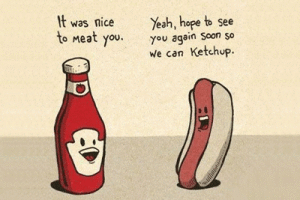
Большинство шуток в английском основаны на каламбуре, его высочестве pun. Каламбур (pun) – это игра слов, небольшое остроумное высказывание, построенное на многозначности слов. А в английском языке почти каждое второе слово может похвастаться не только двумя разными значениями, но зачастую десятью или двадцатью. Отсюда и выходит, что английский – это очень благодатная почва для игры слов. В русском языке тоже есть подобные шутки:
– Официант, это курица?
– Нет, это пьется.
(«курица» созвучно «курится», поэтому такой ответ официанта)
Игру слов часто используют в рекламе и литературных произведениях. Каламбуры бывают разных типов, о них мы и поговорим в этой статье.
Homophonic puns. Омофоны
Юмористический эффект в омофонах достигается за счет того, что слова произносятся одинаково, но пишутся по-разному, соответственно, это абсолютно разные по смыслу слова. Например, board (доска) и bored (заскучавший), weight (вес) и wait (ждать), flower (цветок) и flour (мука).
– Why is it so wet in England?
– Because many kings and queens have reigned (rained) there.
Переводить каламбур на русский язык крайне сложно, а порой невозможно. Ведь reign (править) и rain (идет дождь) в русском не имеют ничего общего по звучанию. Выходит, что если нам кто-то переведет дословно шутку, то ничего смешного в ней не останется. Поэтому мы решили тоже не переводить шутки в статье. Но предлагаем вам кликать 2 раза на незнакомое вам слово, чтобы в правом нижнем углу появился словарик, по которому вы сможете посмотреть, что значит каждое слово, и понять шутку.
– Good heavens! What’s this?
– It’s bean soup.
– I don’t care what it’s been. I want to know what it is now!
Homonymic puns. Омонимы
Омонимы – слова, которые пишутся и произносятся одинаково, но имеют разное значение. Например, bank – место, где люди хранят деньги. И to bank on – делать ставку на что-то. Отсюда идет такая шутка: you can never bank on a bank to look after your money. Или такая: two silkworms had a race and ended in a tie (silkworms – шелкопряды, a tie – галстук, in a tie – вничью).
Compound puns. Составной каламбур
Такие шутки основываются на целой цепочке слов, которые при произношении звучат так же, как какое-то другое слово. Для достижения эффекта необходимо использовать несколько слов.
Why can’t you starve in the desert? – Because of all the sand which is there.
Поняли? Прочитайте быстро слова sand which, и из «песок, который» мы получаем sandwich – бутерброд.
Как научиться понимать каламбур
Научиться понимать каламбур трудно, ведь нужно знать много значений одного и того же слова. Но нет ничего невозможного. В этом плане хорошо помогает практика. Чем больше вы читаете такой материал, разбираетесь в значениях, тем легче вам станет потом.
Если вы хотите понимать современные настроения в мире, то советую установить приложения на английском, в которых шутки создаются обычными людьми. Я начинала бороздить английский Интернет с приложения IFunny 
Также переводные шутки портят впечатление от просмотра сериалов и фильмов, поэтому я всегда советую сразу смотреть их на английском с английскими субтитрами. Особенно это касается комедий. Приведу несколько примеров из моего любимого сериала «Теория Большого Взрыва» (“The Big Bang Theory”). Большинство шуток остроумного доктора Шелдона Купера построено на игре слов. Будьте внимательны и следите за ходом его мыслей. Под видео есть слова с переводом, которые помогут вам понять шутки.
Пенни, напугав Шелдона, спрашивает:
Слова из видео
- Do you have a second? – Есть минутка (или второй)?
- A second – второй, запасной (про нижнее белье).
В начале следующего видео собрана серия шуток по поводу того, что в меню китайского ресторана написали в названии соуса mobster (бандит, мафиози) вместо lobster (лобстер).
Слова из видео
- A typo – опечатка.
- A front for organized crime – прикрытие для организованной преступности.
- For all we know – насколько нам известно; из всего, что мы знаем.
- To contain – включать, содержать.
- Сhunks – куски.
- Deceased mobsters – мертвые мафиози.
- Corleone’s – название пиццерии и имя известного мафиози.
Надеюсь, вы помните, что Раджеш боится общаться с девушками. На этом факте построены многие шутки в сериале, и вот одна из них:
Слова из видео
- To freak somebody out – выводить из себя, пугать.
- Ladybug – божья коровка (lady – леди, bug – жук, а по-английски – божья коровка).
- To render – приводить в какое-то состояние.
- Сatatonic – оцепеневший, неподвижный.
Как видите, каламбур – это не только стилистический прием из устаревших книг, а вполне живой способ создания юмористического эффекта, и к нему прибегают повсеместно. Хотите проверить себя в каламбуре? Тогда предлагаем вам пройти наш тест, в котором надо сопоставить 2 части шутки:
Тест
Каламбур в английском языке
Сопоставьте 2 части так, чтобы получилась шутка.
|
What kind of paper likes music? What do the poor have that the rich don’t want? Why are you eating those electric bulbs? I tried to catch some fog. Why do cows have bells? I wondered why the ball was getting bigger. I’m reading a book about anti-gravity. I’ve been to the dentist many times. |
Then it hit me. It’s impossible to put down. Nothing. So I know the drill. Wrapping paper. Because I’m having a light lunch. I mist. Because their horns don’t work. |
Тест недоступен для мобильных устройств.
Тест недоступен для мобильных устройств.
Если вы нашли ошибку, пожалуйста, выделите фрагмент текста и нажмите Ctrl+Enter.
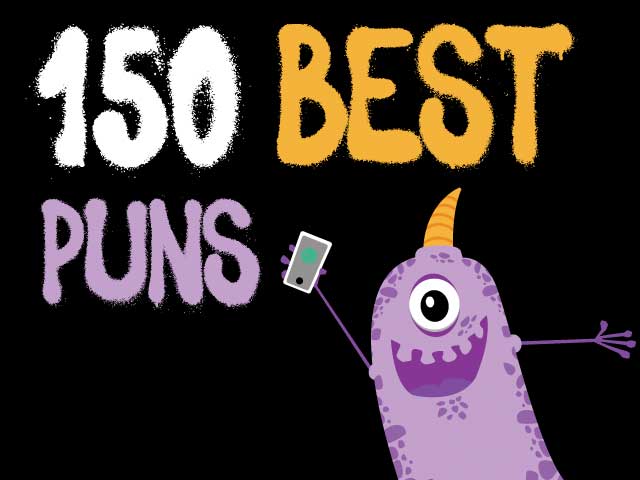
Top Quality Puns! Everyone loves a good pun… Here is a list of the best puns of all time that are fun for the whole family to enjoy. We’re always looking for new hilarious puns to add to the list… So, check back often. Remember, sharing is caring!
Last updated: March 31, 2023
A pun is a form of wordplay that exploits multiple meanings of a term, or of similar-sounding words, for a humorous or rhetorical effect. Puns often involve the use of words with multiple meanings or words that sound similar but have different meanings, and they are often used to create a play on words or to add humor to a sentence or phrase. For example, «I’m reading a book on anti-gravity. It’s impossible to put down!» In this case, the pun is based on the multiple meanings of «put down,» which can mean both «stop reading» and «physically set down.»
A pun is a form of wordplay that exploits multiple meanings of a term, or of similar-sounding words, for a humorous or rhetorical effect. Puns often involve the use of words with multiple meanings or words that sound similar but have different meanings, and they are often used to create a play on words or to add humor to a sentence or phrase. For example, «I’m reading a book on anti-gravity. It’s impossible to put down!» In this case, the pun is based on the multiple meanings of «put down,» which can mean both «stop reading» and «physically set down.»
Pun Definition: A pun is a form of wordplay that involves exploiting multiple meanings of a term or using words that sound alike but have different meanings in order to create a humorous or witty effect. For example, «I told my wife she was drawing her eyebrows too high. She looked surprised.»
On the other hand, a riddle is a type of puzzle that poses a question or problem that requires clever thinking to solve. Riddles often involve wordplay, but they typically have a more straightforward question-and-answer format than puns.
Puns rely on wordplay for their humor, while riddles rely on a clever question or problem to solve.
Puns List
1. Pun: I stayed up all night wondering where the sun went… then it dawned on me.
2. Pun: Reading a book on levitation… couldn’t put it down.
3. Pun: Reading while sunbathing makes you well-red.
4. Pun: I should have been sad when I lost my flashlight… but I was de-lighted.
5. Pun: Light travels faster than sound. That’s why some people appear bright until you hear them speak
6. Pun: I was wondering why the frisbee got bigger as it got closer to me… then it hit me.
7. Pun: I gave away dead batteries… free of charge!
8. Pun: I had amnesia once… maybe twice.
9. Pun: What washes up on tiny beaches? Microwaves.
10. Pun: When two egotists meet, it’s an I for an I.
11. Pun: «I have a split personality,» said Tom, being frank.
12. Pun: A man’s home is his castle, in a manor of speaking.
13. Pun: Dijon vu — the same mustard as before.
14. Pun: How do you make holy water? You boil the hell out of it
15. Pun: I Renamed my iPod The Titanic, so when I plug it in, it says “The Titanic is syncing.”
16. Pun: When life gives you melons, you’re dyslexic.
17. Pun: Shotgun wedding: A case of wife or death.
18. Pun: What did the grape say when it got stepped on? Nothing — but it let out a little whine.
19. Pun: A hangover is the wrath of grapes.
20. Pun: When you dream in color, it’s a pigment of your imagination.
Puns for Kids
21. Pun: Energizer Bunny arrested; charged with battery.
22. Pun: Sea captains don’t like crew cuts.
23. Pun: Will glass coffins be a success? Remains to be seen.
24. Pun: What’s the definition of a will? (Come on, It’s a dead giveaway!).
25. Pun: It’s hard to explain puns to kleptomaniacs because they always take things literally.
26. Pun: A boiled egg in the morning is hard to beat.
27. Pun: Last night, I dreamed I was swimming in an ocean of orange soda. But it was just a Fanta sea.
28. Pun: A plateau is a high form of flattery.
29. Pun: What’s the difference between a hippo and a zippo? One is really heavy and the other is a little lighter.
30. Pun: Two windmills are standing in a wind farm. One asks, “What’s your favorite kind of music?” The other says, “I’m a big metal fan.”
31. Pun: He often broke into song because he couldn’t find the key.
32. Pun: Did you hear about the guy whose whole left side was cut off? He’s all right now.
33. Pun: A backward poet writes inverse.
34. Pun: Every calendar’s days are numbered.
35. Pun: I can’t believe I got fired from the calendar factory. All I did was take a day off.
36. Pun: The man who survived pepper spray and mustard gas is now a seasoned veteran.
37. Pun: A lot of money is tainted. It taint yours and it taint mine.
38. Pun: My dad farted in an elevator, it was wrong on so many levels.
39. Pun: What do you call a bee that can’t make up its mind? A maybe.
40. Pun: When a clock is hungry, it goes back four seconds.
Related: Riddles for Kids
Funny Puns, One Liners
41. Pun: Hear about the new restaurant called Karma? There’s no menu — you get what you deserve.
42. Pun: I went to buy some camouflage trousers yesterday but couldn’t find any.
43. Pun: The man who fell into an upholstery machine is fully recovered.
44. Pun: I tried to sue the airline for losing my luggage. I lost my case.
45. Pun: England doesn’t have a kidney bank, but it does have a Liverpool.
46. Pun: A grenade thrown into a kitchen in France would result in Linoleum Blownapart.
47. Pun: All chemists know that alcohol is always a solution.
48. Pun: You feel stuck with your debt if you can’t budge it.
49. Pun: A police officer just knocked on my door and told me my dogs are chasing people on bikes. That’s ridiculous. My dogs don’t even own bikes.
50. Pun: A bicycle can’t stand on its own because it is two-tired.
51. Pun: Jill broke her finger today, but on the other hand she was completely fine.
52. Pun: I lost my mood ring, and I don’t know how I’m feeling about that.
53. Pun: The furniture store keeps calling me to come back. But all I wanted was one night stand.
54. Pun: The short fortuneteller who escaped from prison was a small medium at large.
55. Pun: When everything is coming your way, you’re in the wrong lane.
56. Pun: Once you’ve seen one shopping center, you’ve seen a mall.
57. Pun: A cross-eyed teacher couldn’t control his pupils.
58. Pun: He had a photographic memory that was never developed.
59. Pun: Those who jump off a Paris bridge are in Seine.
60. Pun: When the past, present, and future go camping they always argue. It’s intense tense in tents.
Puns Jokes
61. Pun: When an actress saw her first strands of gray hair, she thought she’d dye.
62. Pun: What did the janitor say when he jumped out of the closet? SUPPLIES!
63. Pun: Show me a piano falling down a mine shaft, and I’ll show you a flat minor.
64. Pun: Let me tell you about my grandfather. He was a good man, a brave man. He had the heart of a lion, and a lifetime ban from the zoo.
65. Pun: Bakers trade bread recipes on a knead-to-know basis.
66. Pun: A mean crook going down stairs = A condescending con, descending.
67. Pun: My dad, unfortunately, passed away when we couldn’t remember his blood type… His last words to us were, “Be positive!”
68. Pun: What do you call the wife of a hippie? A Mississippi.
69. Pun: Santa’s helpers are subordinate clauses.
70. Pun: I wasn’t originally going to get a brain transplant, but then I changed my mind.
71. Pun: What country’s capital has the fastest-growing population? Ireland. Every day it’s Dublin.
72. Pun: In democracy your vote counts. In feudalism your count votes.
73. Pun: There was a kidnapping at school yesterday. Don’t worry, though — he woke up.
74. Pun: Acupuncture is a jab well done.
75. Pun: How do you throw a space party? You planet.
76. Pun: Marathon runners with bad footwear suffer the agony of defeat.
77. Pun: What do you get when you mix alcohol and literature? Tequila mockingbird.
78. Pun: The poor guy fell into a glass grinding machine and made a spectacle of himself.
79. Pun: How does an attorney sleep? First he lies on one side, then he lies on the other.
80. Pun: Are part-time band leaders semiconductors?
Related: 100 Best Riddles
Work Puns
81. Pun: I have a few jokes about unemployed people, but none of them work
82. Pun: I lost my job at the bank on my very first day. A woman asked me to check her balance, so I pushed her over.
83. Pun: I used to work in a blanket factory, but it folded.
84. Pun: The machine at the coin factory just suddenly stopped working, with no explanation. It doesn’t make any cents.
85. Pun: What are the strongest days of the week? Saturday and Sunday, the rest are weekdays.
86. Pun: Daylight savings time — why are they saving it and where do they keep it?
87. Pun: I hate how funerals are always at 9 a.m. I’m not really a mourning person.
88. Pun: Do pilots in a hurry take crash-courses?
89. Pun: How do you get off a nonstop flight?
90. Pun: Two fish are in a tank, one says to the other «how do you drive this thing?»
91. Pun: I was going to make a chemistry joke, but since I’m kinda late to the thread, the good ones argon.
92. Pun: What’s the difference between a poorly dressed man on a bicycle and a nicely dressed man on a tricycle? A tire.
93. Pun: Does the name Pavlov ring a bell?
94. Pun: I’m not a doctor but I’m losing my patience.
95. Pun: The guy who invented the door knocker got a no-bell prize.
96. Pun: The other day I tried to make a chemistry joke, but got no reaction.
97. Pun: Why do the men in Scotland wear kilts? Because the sheep can hear a zipper a mile away.
98. Pun: I saw an ad for burial plots, and I thought: “That’s the last thing I need!”
99. Pun: What do you call an alligator in a vest? An investigator.
Bad Puns
100. Pun: I like European food so I decided to Russia over there because I was Hungary. After Czech’ing the menu I ordered Turkey. When I was Finnished I told the waiter ‘Spain good but there is Norway I could eat another bite’.
101. Pun: I don’t suffer from insanity. I enjoy every minute of it.
102. Pun: A pessimist’s blood type is always b-negative.
103. Pun: German sausage jokes are just the wurst.
104. Pun: My wife really likes to make pottery, but to me it’s just kiln time.
105. Pun: Need an ark? I Noah guy.
106. Pun: How does Moses make coffee? Hebrews it.
107. Pun: Condoms should be used on every conceivable occasion.
108. Pun: Practice safe eating: always use condiments.
109. Pun: I used to be indecisive; now I’m not so sure.
110. Pun: I fired my masseuse today. She just rubbed me the wrong way.
111. Pun: A Freudian slip is when you say one thing but mean your mother.
112. Pun: Sleeping comes so naturally to me, I could do it with my eyes closed.
113. Pun: If athletes get athlete’s foot, do astronauts get mistletoe?
114. Pun: Local Area Network in Australia: the LAN down under.
115. Pun: Banning the bra was a big flop.
116. Pun: What do you call the ghost of a chicken? A poultry-geist.
117. Pun: A chicken crossing the road is poultry in motion.
118. Pun: I used to be a lumberjack, but I just couldn’t hack it, so they gave me the ax.
119. Pun: Police were called to a daycare center where a three-year-old was resisting a rest.
120. Pun: If electricity comes from electrons, does that mean that morality comes from morons?
Puns Examples
121. Pun: My ex-wife still misses me. But her aim is starting to improve.
122. Pun: A man needs a mistress just to break the monogamy.
123. Pun: Marriage is the mourning after the knot before.
124. Pun: A successful diet is the triumph of mind over platter.
125. Pun: Time flies like an arrow. Fruit flies like a banana.
126. Pun: I’m on a seafood diet. Every time I see food, I eat it.
127. Pun: Is a book on voyeurism a peeping tome.
128. Pun: Dancing cheek-to-cheek is really a form of floor play.
129. Pun: He who laughs last thinks slowest.
130. Pun: Why are frogs so happy? They eat whatever bugs them.
131. Pun: A gossip is someone with a great sense of rumor.
132. Pun: Does killing time damage eternity?
133. Pun: Without geometry, life is pointless.
134. Pun: What did the grape say when it got stepped on? Nothing — but it let out a little whine.
135. Pun: What do you call a super articulate dinosaur? A Thesaurus.
136. Pun: Why aren’t dogs good dancers? Because they have two left feet!
137. Pun: What do you call a man with no arms and no legs stuffed in your mailbox? Bill.
138. Pun: Why is the number six afraid of seven? Because seven ate nine.
139. Pun: What did one flag say to the other? Nothing, it just waved.
140. Pun: How was Rome split in two? With a pair of Ceasars.
Dirty Puns
141. Pun: How can you spot the blind guy at the nudist colony? It’s not hard.
142. Pun: I walked into my sister’s room and tripped on a bra… It was a booby trap.
143. Pun: I bought a boat because it was for sail.
144. Pun: Being vegetarian was a huge missed-steak.
145. Pun: What would you get if you’d put a lawyer in a suit? A lawsuit.
146. Pun: There was a man who entered a local paper’s pun contest. He sent in ten different puns, in the hope that at least one of the puns would win. Unfortunately, no pun in ten did.
147. Pun: An invisible man marries an invisible woman. The kids were nothing to look at either.
148. Pun: Relish today, ketchup tomorrow!
149. Pun: I wanted to be a mime, but I talked myself out of it.
150. Pun: Doctors tell us there are over seven million people who are overweight. These, of course, are only round figures.
Punch, February 25, 1914. The cartoon is a pun on the word «Jamaica».
A pun, also known as paronomasia, is a form of word play that exploits multiple meanings of a term, or of similar-sounding words, for an intended humorous or rhetorical effect.[1] These ambiguities can arise from the intentional use of homophonic, homographic, metonymic, or figurative language. A pun differs from a malapropism in that a malapropism is an incorrect variation on a correct expression, while a pun involves expressions with multiple (correct or fairly reasonable) interpretations. Puns may be regarded as in-jokes or idiomatic constructions, especially as their usage and meaning are usually specific to a particular language or its culture.
Puns have a long history in writing. For example, the Roman playwright Plautus was famous for his puns and word games.[2][3]
Types of puns[edit]
Homophonic[edit]
A homophonic pun is one that uses word pairs which sound alike (homophones) but are not synonymous.[4] Walter Redfern summarized this type with his statement, «To pun is to treat homonyms as synonyms.»[5] For example, in George Carlin’s phrase «atheism is a non-prophet institution», the word prophet is put in place of its homophone profit, altering the common phrase «non-profit institution». Similarly, the joke «Question: Why do we still have troops in Germany? Answer: To keep the Russians in Czech» relies on the aural ambiguity of the homophones check and Czech. Often, puns are not strictly homophonic, but play on words of similar, not identical, sound as in the example from the Pinky and the Brain cartoon film series: «I think so, Brain, but if we give peas a chance, won’t the lima beans feel left out?» which plays with the similar—but not identical—sound of peas and peace in the anti-war slogan «Give Peace a Chance».[6]
Homographic[edit]
A homographic pun exploits words that are spelled the same (homographs) but possess different meanings and sounds. Because of their origin, they rely on sight more than hearing, contrary to homophonic puns. They are also known as heteronymic puns. Examples in which the punned words typically exist in two different parts of speech often rely on unusual sentence construction, as in the anecdote: «When asked to explain his large number of children, the pig answered simply: ‘The wild oats of my sow gave us many piglets.'» An example that combines homophonic and homographic punning is Douglas Adams’s line «You can tune a guitar, but you can’t tuna fish. Unless of course, you play bass.» The phrase uses the homophonic qualities of tune a and tuna, as well as the homographic pun on bass, in which ambiguity is reached through the identical spellings of (a string instrument), and (a kind of fish). Homographic puns do not necessarily need to follow grammatical rules and often do not make sense when interpreted outside the context of the pun.
Homonymic[edit]
Homonymic puns, another common type, arise from the exploitation of words that are both homographs and homophones. The statement «Being in politics is just like playing golf: you are trapped in one bad lie after another» puns on the two meanings of the word lie as «a deliberate untruth» and as «the position in which something rests». An adaptation of a joke repeated by Isaac Asimov gives us «Did you hear about the little moron who strained himself while running into the screen door?» playing on strained as «to give much effort» and «to filter».[7] A homonymic pun may also be polysemic, in which the words must be homonymic and also possess related meanings, a condition that is often subjective. However, lexicographers define polysemes as listed under a single dictionary lemma (a unique numbered meaning) while homonyms are treated in separate lemmata.
Compounded[edit]
A compound pun is a statement that contains two or more puns. In this case, the wordplay cannot go into effect by utilizing the separate words or phrases of the puns that make up the entire statement. For example, a complex statement by Richard Whately includes four puns: «Why can a man never starve in the Great Desert? Because he can eat the sand which is there. But what brought the sandwiches there? Why, Noah sent Ham, and his descendants mustered and bred.»[8] This pun uses sand which is there/sandwiches there, Ham/ham, mustered/mustard, and bred/bread. Similarly, the phrase «piano is not my forte» links two meanings of the words forte and piano, one for the dynamic markings in music and the second for the literal meaning of the sentence, as well as alluding to «pianoforte», the older name of the instrument. Compound puns may also combine two phrases that share a word. For example, «Where do mathematicians go on weekends? To a Möbius strip club!» puns on the terms Möbius strip and strip club.
Recursive[edit]
A recursive pun is one in which the second aspect of a pun relies on the understanding of an element in the first. For example, the statement «π is only half a pie.» (π radians is 180 degrees, or half a circle, and a pie is a complete circle). Another example is «Infinity is not in finity», which means infinity is not in finite range. Another example is «a Freudian slip is when you say one thing but mean your mother.»[9] The recursive pun «Immanuel doesn’t pun, he Kant», is attributed to Oscar Wilde.[2]
Visual[edit]
148th Fighter Squadron emblem, a visual pun in which the squadron’s motto, «Kickin’ Ass», is depicted literally as an ass in the act of kicking even though «kicking ass» is a colloquial expression for winning decisively or being impressive.
Visual puns are sometimes used in logos, emblems, insignia, and other graphic symbols, in which one or more of the pun aspects is replaced by a picture. In European heraldry, this technique is called canting arms. Visual and other puns and word games are also common in Dutch gable stones as well as in some cartoons, such as Lost Consonants and The Far Side. Another type of visual pun exists in languages that use non-phonetic writing. For example, in Chinese, a pun may be based on a similarity in shape of the written character, despite a complete lack of phonetic similarity in the words punned upon.[10] Mark Elvin describes how this «peculiarly Chinese form of visual punning involved comparing written characters to objects.»[11]
Visual puns on the bearer’s name are used extensively as forms of heraldic expression, they are called canting arms. They have been used for centuries across Europe and have even been used recently by members of the British royal family, such as on the arms of Queen Elizabeth The Queen Mother and of Princess Beatrice of York. The arms of U.S. Presidents Theodore Roosevelt and Dwight D. Eisenhower are also canting.[citation needed] In the context of non-phonetic texts, 4 Pics 1 Word, is an example of visual paronomasia where the players are supposed to identify the word in common from the set of four images.[12]
Other[edit]
Richard J. Alexander notes two additional forms that puns may take: graphological (sometimes called visual) puns, such as concrete poetry; and morphological puns, such as portmanteaux.[13]
Use[edit]
Comedy and jokes[edit]
Puns are a common source of humour in jokes and comedy shows.[14] They are often used in the punch line of a joke, where they typically give a humorous meaning to a rather perplexing story. These are also known as feghoots. The following example comes from the movie Master and Commander: The Far Side of the World, though the punchline stems from far older Vaudeville roots.[15] The final line puns on the stock phrase «the lesser of two evils». After Aubrey offers his pun (to the enjoyment of many), Dr. Maturin shows a disdain for the craft with his reply, «One who would pun would pick-a-pocket.»
Captain Aubrey: «Do you see those two weevils, Doctor?…Which would you choose?»
Dr. Maturin: «Neither. There’s not a scrap of difference between them. They’re the same species of Curculio.»
Captain Aubrey: «If you had to choose. If you were forced to make a choice. If there were no other option.»
Dr. Maturin: «Well, then, if you’re going to push me. I would choose the right-hand weevil. It has significant advantage in both length and breadth.»
Captain Aubrey: «There, I have you!…Do you not know that in the Service, one must always choose the lesser of the two weevils.»
Not infrequently, puns are used in the titles of comedic parodies[citation needed]. A parody of a popular song, movie, etc., may be given a title that hints at the title of the work being parodied, replacing some of the words with ones that sound or look similar. For example, collegiate a cappella groups are often named after musical puns to attract fans through attempts at humor.[16] Such a title can immediately communicate both that what follows is a parody and also that work is about to be parodied, making any further «setup» (introductory explanation) unnecessary.
2014 saw the inaugural UK Pun Championships, at the Leicester Comedy Festival, hosted by Lee Nelson.[17] Walsh went on to take part in the O. Henry Pun-Off World Championships in Austin, Texas.[18] In 2015 the UK Pun Champion was Leo Kearse.[19]
Books never written[edit]
Sometimes called «books never written» or «world’s greatest books», these are jokes that consist of fictitious book titles with authors’ names that contain a pun relating to the title.[20] Perhaps the best-known example is: «Tragedy on the Cliff by Eileen Dover», which according to one source was devised by humourist Peter DeVries.[21] It is common for these puns to refer to taboo subject matter, such as «What Boys Love by E. Norma Stitts».[20]
Literature[edit]
Non-humorous puns were and are a standard poetic device in English literature. Puns and other forms of wordplay have been used by many famous writers, such as Alexander Pope,[22] James Joyce,[23] Vladimir Nabokov,[24] Robert Bloch,[25] Lewis Carroll,[26] John Donne,[27] and William Shakespeare.
In the poem A Hymn to God the Father, John Donne, whose wife’s name was Anne More, puns repeatedly: «Son/sun» in the second quoted line, and two compound puns on «Done/done» and «More/more». All three are homophonic, with the puns on «more» being both homographic and capitonymic. The ambiguities introduce several possible meanings into the verses.
«When Thou hast done, Thou hast not done / For I have more.
that at my death Thy Son / Shall shine as he shines now, and heretofore
And having done that, Thou hast done; / I fear no more.»
Alfred Hitchcock stated, «Puns are the highest form of literature.»[28]
Shakespeare[edit]
Shakespeare is estimated to have used over 3,000 puns in his plays.[29] Even though many of the puns were bawdy, Elizabethan literature considered puns and wordplay to be a «sign of literary refinement» more so than humor. This is evidenced by the deployment of puns in serious or «seemingly inappropriate» scenes, like when a dying Mercutio quips «Ask for me tomorrow, and you shall find me a grave man» in Romeo and Juliet.[30]
Shakespeare was also noted for his frequent play with less serious puns, the «quibbles» of the sort that made Samuel Johnson complain, «A quibble is to Shakespeare what luminous vapours are to the traveller! He follows it to all adventures; it is sure to lead him out of his way, sure to engulf him in the mire. It has some malignant power over his mind, and its fascinations are irresistible.»[31] Elsewhere, Johnson disparagingly referred to punning as the lowest form of humour.[32]
Rhetoric[edit]
Puns can function as a rhetorical device, where the pun serves as a persuasive instrument for an author or speaker. Although puns are sometimes perceived as trite or silly, if used responsibly a pun «can be an effective communication tool in a variety of situations and forms».[33] A major difficulty in using puns in this manner is that the meaning of a pun can be interpreted very differently according to the audience’s background with the possibility of detracting from the intended message.[34]
Design[edit]
Like other forms of wordplay, paronomasia is occasionally used for its attention-getting or mnemonic qualities, making it common in titles and the names of places, characters, and organizations, and in advertising and slogans.[35][36]
The Tiecoon Tie shop, in Penn Station NY, an example of a pun in a shop name
Many restaurant and shop names use puns: Cane & Able mobility healthcare, Sam & Ella’s Chicken Palace, Tiecoon tie shop, Planet of the Grapes wine and spirits,[37] Curl Up and Dye hair salon, as do books such as Pies and Prejudice, webcomics like (YU+ME: dream) and feature films such as (Good Will Hunting). The Japanese anime Speed Racer’s original Japanese title, Mach GoGoGo! refers to the English word itself, the Japanese word for five (the Mach Five’s car number), and the name of the show’s main character, Go Mifune. This is also an example of a multilingual pun, full understanding of which requires knowledge of more than one language on the part of the listener.
Names of fictional characters also often carry puns, such as Satoshi’s English name, Ash Ketchum and Goku («Kakarrot»), the protagonists of the anime series based on the video game series Pokémon and the manga series Dragon Ball, respectively, both franchises that are known for including second meanings in the names of many of their characters. A recurring motif in the Austin Powers films repeatedly puns on names that suggest male genitalia. In the science fiction television series Star Trek, «B-4» is used as the name of one of four androids models constructed «before» the android Data, a main character. A librarian in another Star Trek episode was named «Mr. Atoz» (A to Z).
The parallel sequel The Lion King 1½ advertised with the phrase «You haven’t seen the 1/2 of it!». Wyborowa Vodka employed the slogan «Enjoyed for centuries straight», while Northern Telecom used «Technology the world calls on.»[35]
On 1 June 2015 the BBC Radio 4 You and Yours included a feature on «Puntastic Shop Titles». Entries included a Chinese Takeaway in Ayr town centre called «Ayr’s Wok», a kebab shop in Ireland called «Abra Kebabra» and a tree-surgeon in Dudley called «Special Branch». The winning entry, selected by Lee Nelson, was a dry cleaner’s in Fulham and Chelsea called «Starchy and Starchy», a pun on Saatchi & Saatchi.[38]
In the media[edit]
Paronomasia has found a strong foothold in the media. William Safire of The New York Times suggests that «the root of this pace-growing [use of paronomasia] is often a headline-writer’s need for quick catchiness, and has resulted in a new tolerance for a long-despised form of humor.»[39] It can be argued that paronomasia is common in media headlines, to draw the reader’s interest. The rhetoric is important because it connects people with the topic. A notable example is the New York Post headline «Headless Body in Topless Bar».[40]
Paronomasia is prevalent orally as well. Salvatore Attardo believes that puns are verbal humor. He talks about Pepicello and Weisberg’s linguistic theory of humor and believes the only form of linguistic humor is limited to puns.[41] This is because a pun is a play on the word itself. Attardo believes that only puns are able to maintain humor and this humor has significance. It is able to help soften a situation and make it less serious, it can help make something more memorable, and using a pun can make the speaker seem witty.
Paronomasia is strong in print media and oral conversation so it can be assumed that paronomasia is strong in broadcast media as well. Examples of paronomasia in media are sound bites. They could be memorable because of the humor and rhetoric associated with paronomasia, thus making the significance of the soundbite stronger.
Confusion and alternative uses[edit]
There exist subtle differences between paronomasia and other literary techniques, such as the double entendre. While puns are often simple wordplay for comedic or rhetorical effect, a double entendre alludes to a second meaning that is not contained within the statement or phrase itself, often one that purposefully disguises the second meaning. As both exploit the use of intentional double meanings, puns can sometimes be double entendres, and vice versa. Puns also bear similarities with paraprosdokian, syllepsis, and eggcorns. In addition, homographic puns are sometimes compared to the stylistic device antanaclasis, and homophonic puns to polyptoton. Puns can be used as a type of mnemonic device to enhance comprehension in an educational setting. Used discreetly, puns can effectively reinforce content and aid in the retention of material. Some linguists have encouraged the creation of neologisms to decrease the instances of confusion caused by puns.[42]
History and global usage[edit]
Puns were found in ancient Egypt, where they were heavily used in the development of myths and interpretation of dreams.[43]
In China, Shen Dao (ca. 300 BC) used «shi», meaning «power», and «shi», meaning «position» to say that a king has power because of his position as king.[44]
In ancient Mesopotamia around 2500 BC, punning was used by scribes to represent words in cuneiform.[45]
The Tanakh contains puns.[46]
The Maya are known for having used puns in their hieroglyphic writing, and for using them in their modern languages.[47]
In Japan, «graphomania» was one type of pun.[48]
In Tamil, «Sledai» is the word used to mean pun in which a word with two different meanings. This is also classified as a poetry style in ancient Tamil literature. Similarly, in Telugu, «Slesha» is the equivalent word and is one of several poetry styles in Telugu literature.
See also[edit]
- Aesopian language
- Albur
- Alliteration
- Auto-antonym
- Dad joke
- Dajare
- Double entendre
- False etymology
- Mondegreen
- Phono-semantic matching
- Satiric misspelling
- Spoonerism
- Tom Swifty
Notes[edit]
- ^ «paronomasia». rhetoric.byu.edu. Retrieved 2 June 2021.
- ^ a b Pollack, John (14 April 2011). The Pun Also Rises. Penguin Publishing Group. ISBN 978-1-101-51386-6.
- ^ Fontaine, Michael (2010). Funny Words in Plautine Comedy. Oxford University Press.
- ^ «English Grammar Lesson – How very pun-ny of you! – ELC». ELC – English Language Center. 2 August 2016. Retrieved 31 August 2017.
- ^ Puns, Blackwell, London, 1984
- ^ See the citation on Wikiquote
- ^ Asimov, Isaac. Isaac Asimov’s Treasury of Humor, p. 175, § 252. 1971. Houghton Mifflin. New York.
- ^ Tartakovsky, Joseph (28 March 2009). «Pun for the Ages». The New York Times.
- ^ «PUNS». Tnellen.com. Retrieved 20 December 2011.
- ^ Attardo, Salvatore. Linguistic Theories of Humor, p.109. Walter de Gruyter, 1994. Alleton, V.: L’écriture chinoise. Paris, 1970.
- ^ Elvin, Mark, «The Spectrum of Accessibility: Types of Humor in The Destinies of the Flowers in the Mirror«, p. 113. In: Roger T. Ames (et al.): Interpreting Culture through Translation: a Festschrift for D. C. Lau. 1991, pp. 101–118.
- ^ «Paronomasia — Definition and Examples of Paronomasia». Literary Devices. 10 March 2014. Retrieved 2 June 2021.
- ^ Alexander, Richard J. (1997). Aspects of Verbal Humour in English. Narr, Tübingen: Gunter Narr Verlag. pp. 21–41. ISBN 978-3-823-34936-5.
- ^ Worth, Dan (15 May 2008). «Gluttons for pun-ishment». The Guardian.
- ^ Levitt, Paul M. (2002). Vaudeville Humor: The Collected Jokes, Routines, and Skits of Ed Lowry. Southern Illinois University Press. ISBN 978-0-8093-2720-1.
- ^ Chin, Mike (18 May 2011). «How Many A Cappella Group Names are Puns? | The A Cappella Blog». acappellablog.com. Retrieved 5 January 2022.
- ^ Collins, Gemma (14 February 2014). «Comedy Festival Review: The UK Pun Championships at Just The Tonic». Leicester Mercury. Archived from the original on 29 August 2015. Retrieved 1 June 2015.
- ^ «Dave’s Leicester Comedy Festival». Comedy-festival.co.uk. 9 January 2015. Retrieved 1 June 2015.
- ^ «Leo Kearse: Comedian and Writer». leokearse.co.uk. Leo Kearse. Retrieved 1 June 2015.
- ^ a b Partington, Alan (2006). The Linguistics of Laughter: A Corpus-Assisted Study of Laughter-Talk. Routledge. p. 127. ISBN 978-0-41538166-6.
- ^ Booth, David (1990). Writers on Writing: Guide to Writing and Illustrating Children’s Books. Grolier Limited. p. 83. ISBN 978-0717223930.
- ^ Nichol, Donald W, ed. (30 November 2015). Anniversary Essays on Alexander Pope’s ‘The Rape of the Lock’. University of Toronto Press. pp. 21, 41, 81, 102, 136, 141, 245. ISBN 9781442647961. Archived from the original on 10 September 2015. Retrieved 13 August 2016.
- ^ Menand, Louis (2 July 2012). «Silence, Exile, Punning: James Joyce’s chance encounters». The New Yorker. Archived from the original on 31 October 2015. Retrieved 13 August 2016.
- ^ Hitchens, Christopher (1 December 2005). «Hurricane Lolita». The Atlantic. Retrieved 13 August 2016.
- ^ Zinna, Eduardo (2013). «Yours Truly, Robert Bloch». Casebook.org. Retrieved 13 August 2016.
- ^ Appleton, Andrea (23 July 2015). «The Mad Challenge of Translating «Alice’s Adventures in Wonderland»«. Smithsonian. Retrieved 13 August 2016.
- ^ Kaveney, Roz (2 July 2012). «John Donne, priest and poet, part 7: puns in defiance of reason». The Guardian. Archived from the original on 2 May 2015. Retrieved 13 August 2016.
- ^ The Dick Cavett Show (Television production). United States: American Broadcasting Company. Event occurs at 8 June 1972.
- ^ Colbyry, Thomas. «Examples of Puns in Shakespeare’s Writings». Entertainment Guide. Demand Media. Archived from the original on 2 September 2015. Retrieved 13 August 2016.
- ^ Tartakovsky, Joseph (28 March 2009). «Pun for the Ages». The New York Times. Retrieved 31 March 2021.
- ^ Samuel Johnson, Preface to Shakespeare.
- ^ Rogers, Bruce (1999). You Can Say That Again!. Dundurn. p. 95. ISBN 9781554880386.
- ^ Junker, Dave (February 2013). «In Defense of Puns: How to Use them Effectively». Public Relations Tactics. 20 (2): 18.
- ^ Djafarova, Elmira (June 2008). «Why Do Advertisers Use Puns? A Linguistic Perspective». Journal of Advertising Research. 48 (2): 267–275. doi:10.2501/s0021849908080306. S2CID 167457581.
- ^ a b «The Art and Science of the Advertising Slogan». Adslogans.co.uk. Retrieved 20 December 2011.
- ^ «Archived copy» (PDF). Archived from the original (PDF) on 22 July 2011. Retrieved 1 May 2010.
{{cite web}}: CS1 maint: archived copy as title (link) - ^ Collins, Michelle (6 June 2008). «The 50 Best Pun Stores». BestWeekEver.tv. Archived from the original on 21 June 2012. Retrieved 2 December 2012.
- ^ «Financial Abuse, Ikea Complaints, Damart Marketing, You and Yours». BBC Radio 4. BBC. 1 June 2015.
- ^ Safire, W. (1980). «On Language: A Barrel of Puns». The New York Times. p. SM2.
- ^ Vincent, Musetto (9 June 2015). «Vincent Musetto, 74, dies». The New York Times. Retrieved 27 August 2015.
- ^ van Mulken, Margot; Renske van Enschot-van Dijk; Hans Hoeken (May 2005). «Puns, relevance and appreciation in advertisements». Journal of Pragmatics. 37 (5): 707–721. CiteSeerX 10.1.1.946.7625. doi:10.1016/j.pragma.2004.09.008.
- ^ Shakespeare Survey – Volume 23 – Page 19, Kenneth Muir – 2002
- ^ Pinch, Geraldine Pinch (1995), Magic in ancient Egypt, University of Texas Press, p. 68.
- ^ Waley, Arthur (1982), Three ways of thought in ancient China Stanford University Press, p. 81.
- ^ Robson, Eleanor (2008), Mathematics in ancient Iraq: a social history, Princeton University Press, p. 31.
- ^ Whedbee, J. William (28 May 1998). The Bible and the Comic Vision. Cambridge University Press. ISBN 9780521495073. Retrieved 7 February 2018 – via Google Books.
- ^ Danien, Elin C.; Robert J. Sharer (1993), New theories on the ancient Maya, University of Pennsylvania. University Museum of Archaeology and Anthropology, UPenn Museum of Archaeology, p. 99.
- ^ Brown, Delmer M.; John Whitney Hall (eds), The Cambridge History of Japan: Ancient Japan, Cambridge University Press, 1993, p. 463.
References[edit]
- Augarde, Tony (1984). The Oxford Guide to Word Games. London: Oxford University Press. ISBN 978-0-19-214144-6.
- Hempelmann, Christian F. (September 2004). «Script opposition and logical mechanism in punning». Humor: International Journal of Humor Research. 17 (4): 381–392. doi:10.1515/humr.2004.17.4.381. S2CID 144409644. (access restricted)

